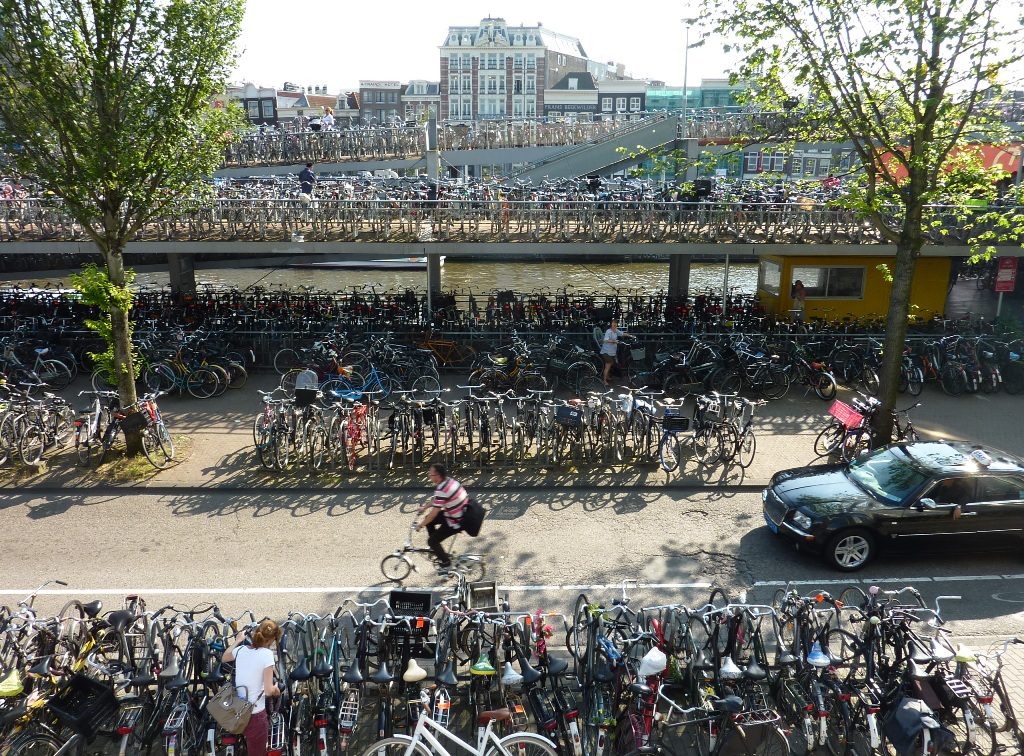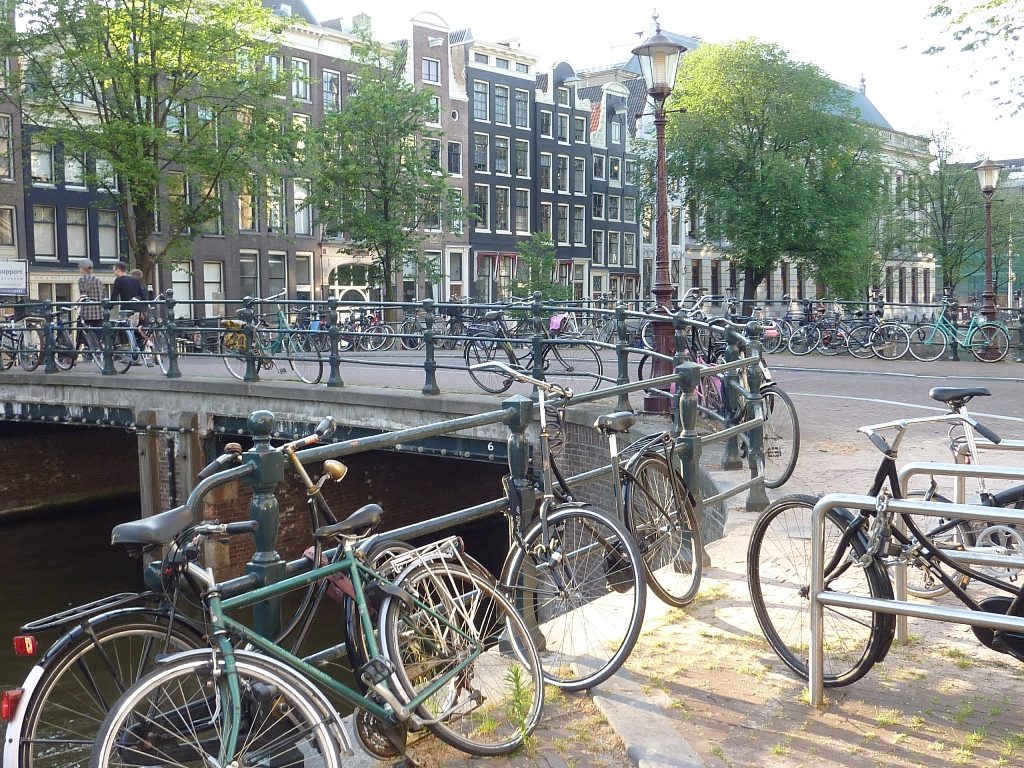After a year in which most of us have been unable to do any overseas travel, it is nice to reminisce on opportunities in the past to visit interesting new places. Regular viewer Frank Dohmen (Cyclomaniac) provided a guest post about his return to the Netherlands (originally posted in Oct 2013) and, while we can sympathise with their current lockdown predicament, we can still drool at the bike-friendly culture they have long displayed. I was certainly grateful for the opportunity to make my own pilgrimage there a couple of years later, learning many valuable lessons about what makes their bike system tick…
After been away for 7 years we decided to visit family and friends in our home country the Netherlands. Since our friends and family are quite spread over the country we were facing a lot of travel time. Not looking forward to face the traffic jams we once ran so eagerly away from, we decided that it would be great to cycle around the country. This way we could visit quite a few people and still have a holiday of our own too.
We booked a ticket with Emirates which allowed 30 kg of baggage on this flight. Since our bikes weigh about 15 kg this left us with the remaining 15 kg for panniers, clothes and some light-weight presents. Our bikes were packed in a carton bicycle box obtained from a bike shop; vulnerable parts wrapped in carton and some old clothes. We have done this quite a few times before, but it leaves you with a practical problem when you arrive at your destination. You cannot bike with these boxes and have to throw them away at the airport and find another box for your flight back home, or find another means of transport that will enable you to bring the big box. We decided to dispose of the carton boxes at the airport and, for the return flight, purchased a plastic bike flight bag and wrapped all vulnerable parts of the bikes really well with carton and old clothes. A flight bag may be slightly riskier than a carton box but worked for us.
First day trip we went to Amsterdam to meet an old friend. As you might expect there are bikes everywhere, ridden by natives and tourists. There is no helmet requirement in the Netherlands and the tourists can generally be spotted quite easily by looking who is riding with a helmet. The use of cargo bikes seems to have exploded in the Netherlands and many people move their kids, dogs (?) and groceries around by bike. Police have sort of given up on fining cyclists running red lights so there is a lot of anarchy around, just the sort of thing what you would expect of Amsterdam really.
The multi-storey bike parking at Amsterdam Central Station is impressive, with parking for 2500 bikes. This is the largest bike parking facility in Amsterdam but there many more around . The Amsterdam Council has decided to increase the parking facilities by 38,000 in 2020. Most train station bike parking facilities also offer reparations and bike rent-outs. The OV-fiets (rental bike) can be rented for only 3.15 euros a day from 240 train stations across the country.
After a couple of days we started biking. The Netherlands has a comprehensive nationwide cycling network (see http://www.youtube.com/watch?v=sx1TsHc4ZgI). The network consists of:
- Signposted routes: often used for everyday cycling, they offer a quick and safe route to get you to the next town or village.
- Provincial routes: these routes always have a theme, usually focussed on history or the natural environment. These are day tours only.
- Numbered cycling network: you basically create your own route. This network now includes over 30,000 km of cycle paths. The network consists of numbered junctions. At each numbered junction you can stop and and look on the map beside the cycle path and plan your next leg of the journey choosing a different junction number. You can download an app to assist you in navigating the routes.
- Long distance routes: cross country routes, often themed as well. These cover over 6,000 km.
We chose the long distance routes, which cunningly steer you away from the Dutch hustle and bustle. These routes lead you through through historic villages, past charming old pumphouses, along canals and through forests. Most of the routes are completely off the main road. Along the way you can stop at farms who offer coffee and home-made cakes or cookies to cyclists.
You might expect otherwise, but the country’s cycling infrastructure is often surprisingly low-tech. However, the cycling network is extensive, mostly separated from motor traffic, and cycle paths and lanes are uninterrupted. I sometimes notice in Christchurch that cycle lanes seem to disappear just when you need them most, e.g. busy shopping streets, increased bus traffic, parked cars, intersections etc. You will not see this very often in the Netherlands. The Dutch network is developed for cyclists of all abilities and you will see three-year olds riding as well as the 90 year-old grandma. Contrary to popular belief it is not mandatory to ride a bike in the Netherlands but if you want to you can do so with minimal risk. A bike ride is also much more enjoyable when you don’t need to worry about passing trucks or cars.
We did see a few interesting pieces of infrastructure. Quite a few cycle traffic lights are equipped with an indicator that shows you how long you have to wait for a green light. Worked for us as we did not run any red light. We also rode on a few bicycle priority streets, which are interesting because, on these streets, cars are guests and should give way to bicycles at all times. Many councils offer free surveilled bicycle parking in order to attract people into cities and towns. Most streets in the suburbs have speed bumps and a 30 km/h maximum speed. We also saw the Barnes Dance intersection in action on a busy intersection and it worked brilliantly! There also many possibilities to recharge your e-bike for free.
In the Netherlands you are not only protected by infrastructure but the law contributes too. In general Dutch civil law is pretty ruthless for drivers when there is an accident involving a cyclist. If the cyclist is younger than 14 years, the driver is liable regardless. If the cyclist is 14 years or older the driver is liable unless the driver can prove that the accident happened because of factors beyond his or her control. Drivers will be prosecuted under criminal law if deemed appropriate.
Is it perfect for cycling? Nahh not yet. You cannot bring your bike on the bus. You are allowed to bring your bike on the train but only outside peak hours but you will have to share the space with prams; entering and leaving the train wagon can be challenging because your way out might be obstructed by other bikes and prams. Recommended for a cycling holiday? Absolutely!!!
What do you like about the Netherlands?


